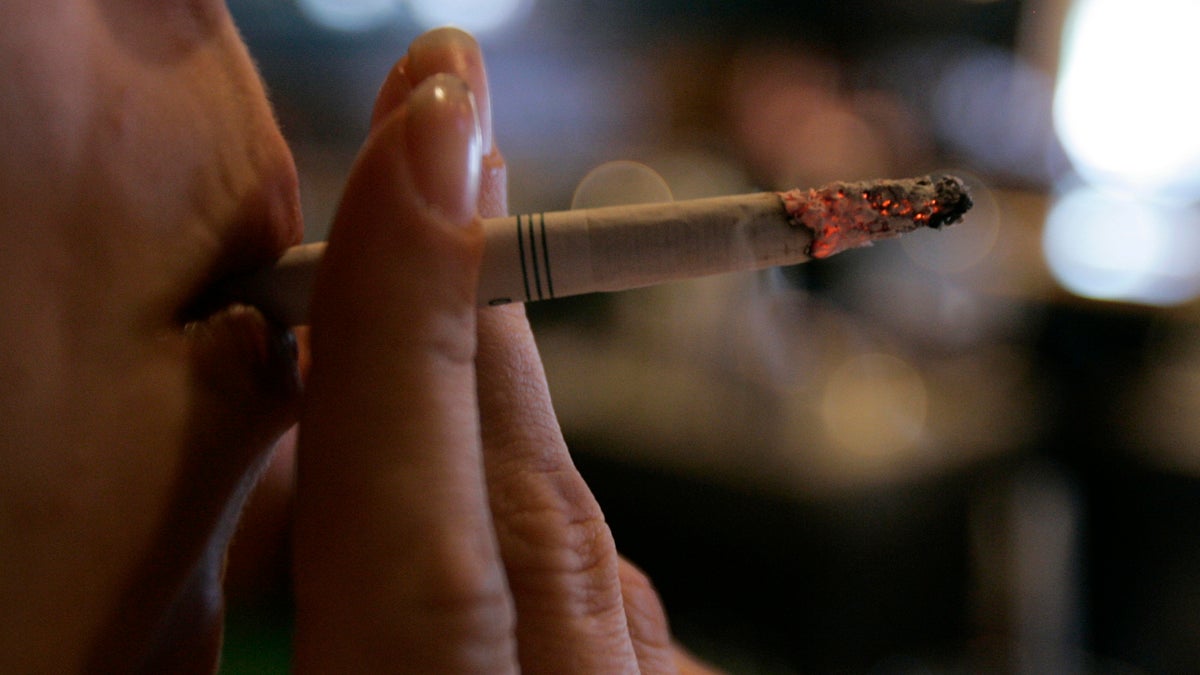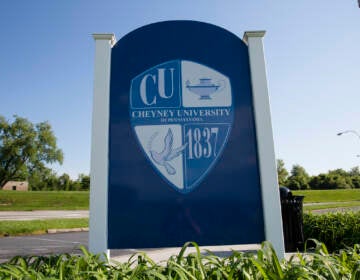Lincoln, Cheyney latest to ban tobacco on campus
Fewer than half of the 102 historically black colleges and universities have comprehensive smoke-free or tobacco-free policies.

(AP, file)
Three Philadelphia-area colleges are going smoke-free for 2018. Fewer than half of the 102 historically black colleges and universities — and only one-third of the nation’s community colleges — have comprehensive smoke-free or tobacco-free policies.
A recent initiative is helping colleges that predominantly serve minorities adopt these policies.
CVS Health Foundation and Truth Initiative teamed up to help minority-serving institutions adopt smoke-free policies with two-year $10,000 grants.
Pennsylvania’s two historically black universities — Lincoln and Cheyney — serve populations that the tobacco industry has targeted.
“We see in the African-American community, for example, 10 times the number of cigarette ads than other neighborhoods,” said Cianti Stewart-Reid, vice president of Campaigns, Community Youth Engagement at Truth Initiative. “In low-income neighborhoods, there are more cigarettes closer to schools. And so we know that that is not a coincidence. It is profiling. And we believe that is a social injustice and needs to be called out.”
This initiative looks at smoking as more than a public health issue to focus on reaching marginalized populations that have been disproportionately profiled with tobacco marketing.
College campuses are important since 99 percent of regular smokers start before age 26, Stewart-Reid said.
“We know that those communities serve a number of first-generation students, low-income students and communities of color who have traditionally been targeted by Big Tobacco,” she said. “And so we want to help those colleges and universities go tobacco-free and be the first generation to end smoking.”
A poll commissioned by CVS Health shows 57 percent of college students believe a tobacco-free campus is important when applying to or selecting a school.
Campus smoking bans are part of a growing trend.
As of October, Pennsylvania has 20 completely smoke-free institutions, while New Jersey has 10 and Delaware had four, according to the American Nonsmokers’ Rights Foundation list.
A healthy opportunity
Lenetta Lee, associate vice president for student affairs and dean of students at Lincoln University, said this initiative was another opportunity to become a healthier institution.
“We instituted, for example, zero tolerance for weapons and assaults. Our dining services are making changes in terms of healthy food,” she said.
The school implemented the tobacco-free task force in 2015, which included smokers and nonsmokers.
“The smokers had excellent input, in their mind, on the advantages and disadvantages of smoking,” Lee said. “They would bring a different perspective, which aided us with moving forward.”
The school, which has turned smoking areas into gardens, will enforce the tobacco-free policy in January.
Be free
A new report shows Pennsylvania ranks 26 out of 50 in allocation of settlement funds from a tobacco lawsuit that are earmarked for combating tobacco use. Pennsylvania only uses 11 percent of the funding level recommended by the Centers for Disease Control and Prevention.
The CVS Health Foundation and Truth Initiative grants for tobacco prevention and cessation program help fill some of that gap.
Thom Nixon, associate director of community living and judicial affairs at Cheyney, said officials there have been educating the community and plan to be smoke-free by January.
The task force has used the grant money for educational, social and cultural programs, including town halls, student forums and speaker series, he said.
“We’ve … brought speakers to talk about tobacco as social-justice issues, specifically as it relates to the African-American community and low-income community,” Nixon said. “Just looking at the harmful effects of tobacco on your body and how that would impact your life in terms of your life expectancy, but also looking at your professional career and how it impacts [that.]”
Nixon, who chairs the “Be Free 2017!” task force, said the school has also rented buses to take students to the American Heart and Stroke Association walks for two years.
Community partner Main Line Health offers free access to help smokers modify their behavior by addressing the physical and psychological aspects that lead to addiction.
According to statistics, African-Americans smoke menthol cigarettes at nearly three times the rate as whites, have a more difficult time quitting, and are more likely to die from smoking-related illnesses.
An improvement
Community College of Philadelphia went smoke-free at the beginning of 2017, but will start enforcing the ban in January.
The grant provided an opportunity to get support for the whole campus to be smoke-free, said Kristy Shuda McGuire, associate professor of biology. She acknowledged that, on an urban campus, there are limitations.
“Anecdotally, we think that it has made a difference,” she said. “Although we have no control over the city streets and sidewalks, but from areas where people used to smoke to areas where we still will have some smokers and violations, we feel like we’ve seen improvement.”
Surveys in 2015 showed 27 percent of CCP students said they smoked in the last 30 days. In the spring, after the policy was implemented, 19.7 percent of students surveyed said yes.
The task force has created a website with cessation info and is working with Smoke Free Philly, a part of Philadelphia Department of Public Health.
“People tell us that they feel like it’s better on campus, and that they don’t have to walk through a cloud of smoke on their way in every morning to building,” Shuda McGuire said. “It still might happen, but they’ve seen improvement in the frequency with which it happens.”
Bucks, Delaware and Montgomery community colleges have had tobacco-free campuses for several years.
WHYY is your source for fact-based, in-depth journalism and information. As a nonprofit organization, we rely on financial support from readers like you. Please give today.




